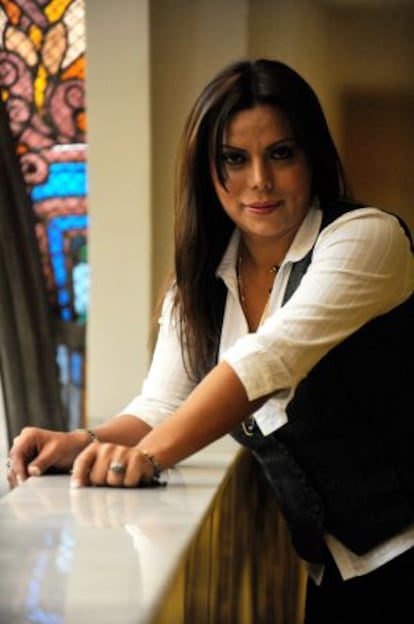"Being transsexual has helped me get where I am in Mexico"
PRD candidate is running for a seat in capital's assembly


Diana Sánchez Barrios doesn't usually like to have coffee with her breakfast - she prefers tea. She only drinks coffee on the days that she needs an extra boost, and this particular day is one of them. "We haven't stopped for a minute. We need to make a lot of effort," she says.
Sánchez is a transsexual who is running for a seat in Mexico City's legislative assembly on behalf of the leftist Democratic Revolutionary Party (PRD).
At the age of 16, Javier Alejandro stopped being Javier Alejandro, after he discovered his true sexual identity. The sudden transformation forced him to leave school as well as abandon his parents' home.
Diana survived on the rough streets of the Mexican capital, working as a street vendor selling clothes and women's dress shoes. "There are a lot more opportunities in this field for people of diverse sexuality," she says. "At that time, it was impossible to find work because if they asked for your papers, they would see that you were a man and wouldn't give you a job."
But thanks to the Law of Generic Sex Concordance, passed by the progressive assembly in the Mexican capital, her identity papers and other legal documents allowed for the name change to Diana Sánchez Barrios.
Mexico City has become a civil rights leader in the country - generally famed for its macho culture - having also passed same-sex marriage legislation in December 2009. "It is an important advance for our collective. I see how difficult life is for my friends who are being discriminated against and persecuted in other states, including the fact that some have been murdered just because they are gay or transsexual," says Diana. "That is why we need to push for similar rights in other areas of the country, and give people information about our situation. That's how I was able to win over my family."
But things were not so easy for her in Mexico City. "When I was 22 I had just began my hormonal process, and I was thrown out of a restaurant because I went to the ladies' restroom. I was so young, I didn't know how to defend myself. It was very humiliating."
At 26, she went back to school and later got a management degree.
Years later she founded Prodiana, a pro-rights association that served as a springboard so that she could preside over the PRD's National Commission for Sexual Diversity. And now she is running for a seat in the Mexico City assembly.
"At this point being transsexual doesn't matter - it all depends on a person's abilities. But look, let's be honest: I think my condition has helped me because it has allowed me to preside over a committee and achieve a good number of goals in many different states."
Tu suscripción se está usando en otro dispositivo
¿Quieres añadir otro usuario a tu suscripción?
Si continúas leyendo en este dispositivo, no se podrá leer en el otro.
FlechaTu suscripción se está usando en otro dispositivo y solo puedes acceder a EL PAÍS desde un dispositivo a la vez.
Si quieres compartir tu cuenta, cambia tu suscripción a la modalidad Premium, así podrás añadir otro usuario. Cada uno accederá con su propia cuenta de email, lo que os permitirá personalizar vuestra experiencia en EL PAÍS.
¿Tienes una suscripción de empresa? Accede aquí para contratar más cuentas.
En el caso de no saber quién está usando tu cuenta, te recomendamos cambiar tu contraseña aquí.
Si decides continuar compartiendo tu cuenta, este mensaje se mostrará en tu dispositivo y en el de la otra persona que está usando tu cuenta de forma indefinida, afectando a tu experiencia de lectura. Puedes consultar aquí los términos y condiciones de la suscripción digital.








































